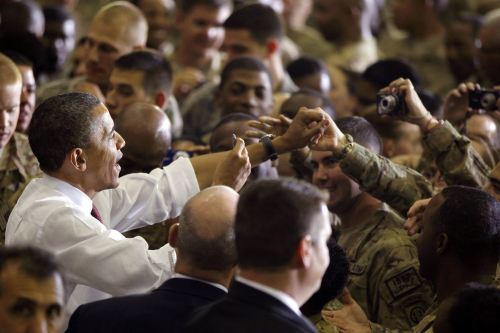U.S. president signs strategic partnership agreement with Karzai
KABUL (AFP) ― President Barack Obama furtively descended from night skies into Afghanistan, signing a deal cementing post-war ties with Kabul after 2014, one year to the day after U.S. elite forces killed Osama bin Laden.
Obama, showcasing the death of the al-Qaida leader as testimony of his leadership as he seeks reelection, made a covert, unannounced flight aboard Air Force One for a swift and symbolic visit to Kabul.
He signed a post-war partnership deal with President Hamid Karzai, told U.S. troops their sacrifice had made a “light on the horizon” ahead, and was to make a major televised address to the American people on the progress of the war.
“Neither Americans nor the Afghan people asked for this war, yet for a decade we’ve stood together,” Obama said early Wednesday, signing a 10-page pact pledging U.S. aid to Afghanistan for 10 years after 2014 when NATO combat troops leave.
“I’m here to affirm the bond between our two countries and to thank Americans and Afghans who have sacrificed so much over these last 10 years,” he said at Karzai’s presidential palace.

President Barack Obama addresses troops at Bagram Air Field, Afghanistan, Wednesday. (AP-Yonhap News)
“We look forward to a future of peace. Today we’re agreeing to be long-term partners.”
The pact foresees the possibility of American forces staying behind to train Afghan forces and pursue the remnants of al-Qaida but does not commit Washington to specific troop or funding levels for Afghanistan.
It is also meant to send a signal to U.S. foes that despite ending the longest war in U.S. history, Washington intends to ensure Afghanistan does not again turn into a haven for terror groups like al-Qaida.
“This agreement will make clear to the Taliban, al-Qaida and other international terrorist groups that they cannot wait us out,” said a senior U.S. official.
Officials also stressed however that it was important to stick to a U.S. strategy to train Afghan troops and transfer control for security to the fledgling Afghan army in the next two years.
The deal, reached after months of painstaking negotiations, also states that the United States does not seek permanent military bases in Afghanistan and was concluded just over two weeks before a NATO summit in Chicago. Later, Obama, the commander-in-chief of American troops, addressed soldiers at Bagram air force base.
“It’s still tough, the battle is not yet over. Some of your buddies are going to get injured, some of your buddies may get killed,” Obama said.
“There is going to be heartbreak and pain and difficulty ahead, but there is a light on the horizon because of the sacrifices you have made.”
Obama, making his third trip to Afghanistan since taking office in 2009, was to make a televised address beamed live to U.S. television networks at 2330 GMT Tuesday. The trip underlined the symbolic power of the presidency at a time when Obama is locked in a fierce row with his Republican election foe Mitt Romney over claims he is hyping the bin Laden death anniversary for political gain.
On Monday, Obama had publicly questioned whether Romney would have taken the same decision as he did to launch an elite Navy SEALs raid deep into Pakistan to kill bin Laden in his lair in Abbottabad.
Romney’s campaign accused Obama of inappropriately exploiting a moment of great national unity for political gain.
Obama’s vanquished 2008 election foe Senator John McCain welcomed Obama’s decision to travel to Afghanistan, days after lashing him for exploiting the bin Laden raid.
“I hope the president’s speech tonight will emphasize the degree of our commitment in Afghanistan, rather than the plans for withdrawal,” McCain said.
“I would urge the president to return from this visit and spend more time speaking directly with the American people about the vital national security interests at stake in Afghanistan and the need for the United States to remain strongly engaged there in the years ahead.”
The U.S. war in Afghanistan has cost the lives of nearly 3,000 U.S. and allied troops, seen thousands of Afghans killed and cost hundreds of billions of dollars.
Obama, who has already carried out his pledge to end the war in Iraq, will campaign for November’s election on a platform to bring all troops home from the Afghan war.
Ties between Kabul and Washington have been strained since last May amid a series of massacres and incidents by U.S. troops against Afghan civilians as a 130,000-strong U.S.-led NATO force fights a fierce Taliban insurgency.
NATO forces have also suffered a string of deaths as the Afghan troops they were sent to the war zone to train turned their guns on them.
The last of the remaining 87,000 American combat troops in the country are due to pull out by the end of 2014.
Obama announced last year that all of the 33,000 surge troops he sent to Afghanistan would be home by the middle of this year.
Officials say no new decisions will be made on future troop numbers until those troops are home, but they expect a continued downward trajectory.
News of bin Laden’s death broke in Washington late on May 1, 2011, and in Pakistan on May 2, owing to the time difference.






